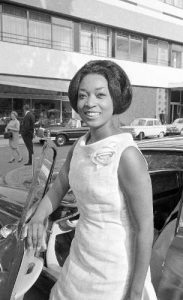Podcast: Play in new window | Download (Duration: 1:43:34 — 127.2MB) | Embed
Subscribe: Spotify | TuneIn | RSS | More
I’ve been wanting to revisit the legacy of the great African American soprano Gloria Davy (born in Brooklyn on 29 March 1931 and died in Genève on 28 November 2012) for some time now. In the first year of the podcast, I devoted one of my very first Black History Month episodes to exploring her career, recordings, and legacy. At that time, however, I had not yet acquired a commercial recording central to her recorded output: a 1957 LP on London Records entitled, simply, Concert Recital, which featured the soprano, accompanied by Giorgio Favaretto, in a varied program of Purcell and Brahms songs, followed by two important twentieth century song cycles, Poulenc’s 1939 cycle Fiançailles pour rire, set to poems by his close friend Louise de Vilmorin, and Joaquín Turina’s 1918 cycle, Poema en forma de canciones. A few years after posting that episode, I finally got my hands on this ultra-rare recording, which I am thrilled to present here. Recordings of either or both of those song cycles in particular were rare at the time this recording was made, and recordings of the complete Turina cycle remain so. On this record I supplement this record with her first London/Decca release from the year 1956, entitled simply Gloria Davy Spirituals. I have already played these recordings on the podcast, but they are always worth rehearing, especially because the spirituals, many of them quite off-the-beaten-path, are arranged and conducted by African American composer Julia Perry, who has only recently, particularly in the year of her centennial, been gaining the public exposure that she so richly deserves. In between I include additional examples of Gloria Davy in song, including excerpts from an early-career performance of Poulenc’s Caligrammes, his final cycle of poems by Guillaume Apollinaire, as well as an obscure but rousingly rendered song by the Italian composer, conductor, pianist, and teacher Vittorio Maria Vanzo.
Countermelody is a podcast devoted to the glory and the power of the human voice raised in song. Singer and vocal aficionado Daniel Gundlach explores great singers of the past and present focusing in particular on those who are less well-remembered today than they should be. Daniel’s lifetime in music as a professional countertenor, pianist, vocal coach, voice teacher, and journalist yields an exciting array of anecdotes, impressions, and “inside stories.” At Countermelody’s core is the celebration of great singers of all stripes, their instruments, and the connection they make to the words they sing. By clicking on the following link (https://linktr.ee/CountermelodyPodcast) you can find the dedicated Countermelody website which contains additional content including artist photos and episode setlists. The link will also take you to Countermelody’s Patreon page, where you can pledge your monthly or yearly support at whatever level you can afford.


